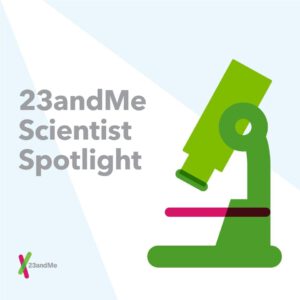“I feel that genetics is something that everyone has a deep intuition about.”
This interview is part of an occasional series of profiles introducing you to the people behind 23andMe’s compelling research. Nick Furlotte studied computer science and bioinformatics at the University of Memphis and later received his Ph.D. in computer science from UCLA.
At 23andMe, Nick tries to understand the relationships between disease risk, genetics, and lifestyle. He does this by looking at gene-by-environment interactions and by finding new associations between phenotypes. He’s found for example, that there’s an association between stress levels and average fruit intake per day.
What were you researching before you came to 23andMe?
My background is in computational genetics. At a high level, that means I was developing statistical and computational approaches for solving problems that fell in the arena of genetics.
I worked mostly on a particular class of statistical models called linear mixed-models.
These models have been used since the 1950s in cattle breeding programs. They were used to do things like maximizing milk yield, and have been found to be extremely useful in mouse and human genetics. When you start to scale up to large sample sizes, linear mixed-models become computationally cumbersome. So I spent a lot of time making these models faster. This allows us to apply some very powerful techniques to problems in human genetics. For example, trying to understand the relationships between genotypic and phenotypic variation.
Why are you excited about genetics?
Genetics is something that everyone has a deep intuition about. We just haven’t always called it that. Throughout human history, we have cared about mating, and mates have been selected based on their observable traits (both genetic and non-genetic) and on the hypothetical offspring, they will have – that’s genetics.
Originally from: Memphis, TN
Education:
BA: Computer Science, University of Memphis
MA: Bioinformatics, University of Memphis
PhD: Computer Science, UCLA
Fun Fact:
I wanted to be an actor or comedian in high school.
Find him at: http://whatmind.com/nickFurlotteCV.pdf
It’s an exciting time in genetics because we are entering a stage of exponential growth, where the advances we make in understanding the role of genetics in complex diseases are about to explode. I am excited to be a part of this period of history and to help create it. I think it will be really cool to look back at this time 30 years down the road and muse about how far we have come and how fast things have moved.
Tell us about a recent breakthrough in genetics research that you think will have a big impact.
The movement of genetics into the information age will have a huge impact. We’ve already seen major shifts in the way genetics research is carried out through large scale efforts like the HapMap or the 1000 Genomes Projects.
The shift will be even more extreme as sequencing becomes less expensive and more approachable.
As full genome sequencing scales from 1,000 to 2,000 people being sequenced to having the full sequence of millions of people, we will have extremely dense information about people, their environment and even their lifestyles and biomes.
This kind of dense information and the computational infrastructure to support its analysis will lead to a system where the turnaround time for discoveries is faster than we have ever seen before. With the right system in place, we will be able to use these discoveries to help decrease the incidence of disease.
Tell us about one of your interesting research findings.
I previously found some interesting results related to gene-by-environment interactions. It turns out that the risk attributed to certain genetic factors is actually dependent on your actions. While we know that certain genetic factors predispose to obesity while others may protect against it, a recent study published in PLOS Genetics adds a twist.
Researchers showed that a set of 12 genetic factors known to be associated with obesity had less of an effect in people who exercised more and a larger effect in people who did not exercise as often. We examined the same idea using the data from 23andMe customers and 
In general, we find a lot of unique associations between phenotypes at 23andMe, sometimes these come in the form of ‘ah-ha’ moments, while other times they can be very surprising.
For example, I found one interesting association between increased fruit intake and decreased stress levels. It’s kind of fun to think about the causality there. Do people with more leisure time typically have less stress? Do they also have more time to eat fresh fruit, while high-stress people pressed for time grab something pre-made? Is it socio-economical? Or is a high fruit diet actually leading to decreased stress? I’m not sure, but I now eat like 3 apples and a couple of bananas every day.
What’s one thing the average person should know about genetics?
I sometimes hear people say, “I don’t want to know.” But what they should know is that genetics is not deterministic. Most of us are going to have problems with things like Type 2 Diabetes, Heart Disease, and other cardiovascular diseases. Yet our environment plays a large role in the development of these diseases. And while you might be at a higher than average risk for obesity, maybe that only applies if you’re 100 percent sedentary. It’s a dynamic and complex system and it’s the very early days of what we know!
What interesting thing have you learned about yourself from being tested?
In addition to testing myself with 23andMe, I had my grandparents tested. My grandmother recently passed away at 88 and my grandfather just turned 92. Their results reflected some of the things I’ve already observed in them. It’s also interesting to look at the ancestry finder map and see how many distant cousins I have. You can easily see a migration bubble. I’d love to give out kits at an upcoming family reunion to investigate our ancestry more thoroughly.



